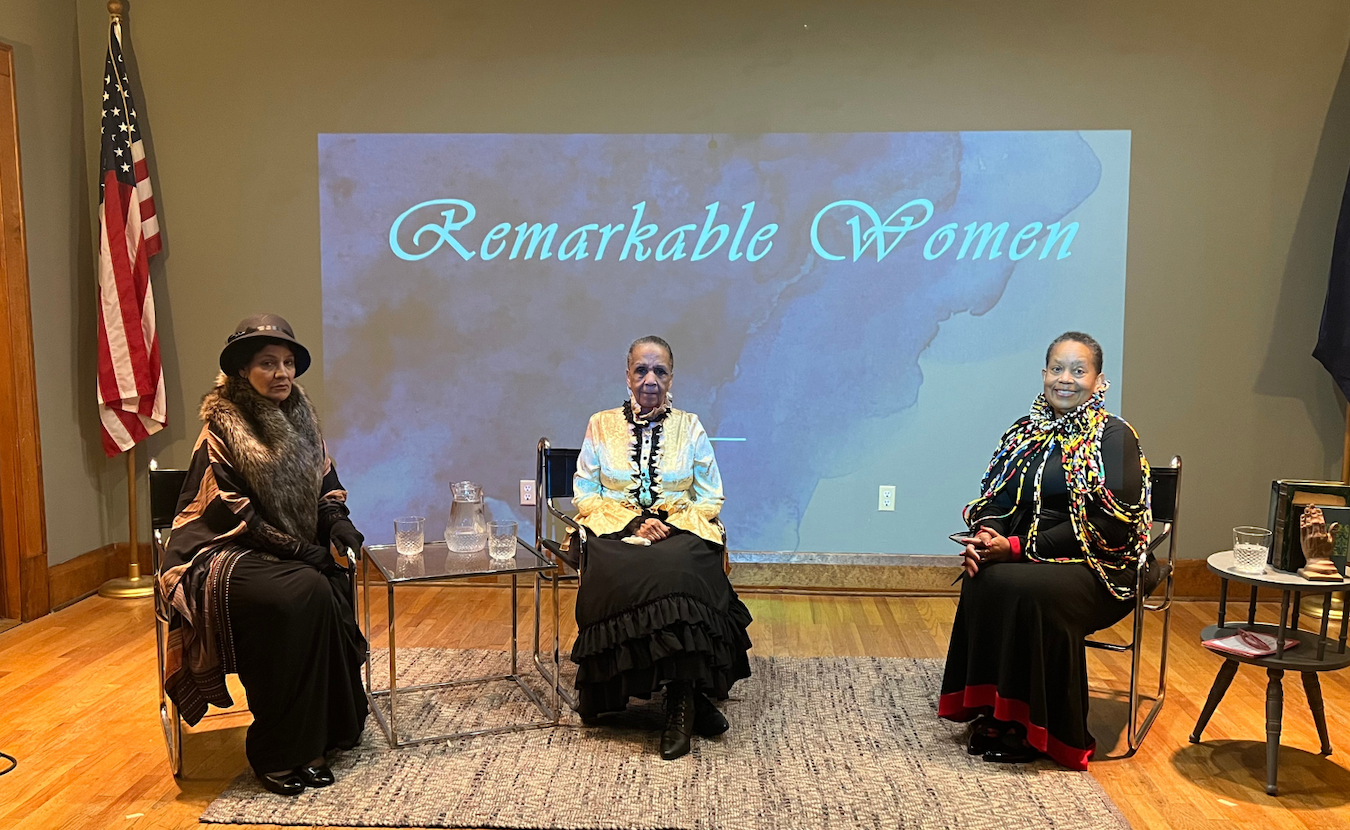“History Reclaimed. Stories Retold. Theatre Revealed.” This is what Resilience Productions is all about. More Than Your Honor: An Evening with Judge Viola Taliaferro, an original one-act play and the 11th installment of The Remarkable Women Series, is the latest production of the Resilience team, led by director Danielle Bruce, playwright Dr. Gladys DeVane, and historian Liz Mitchell. The three women share their personal experiences and unique contributions to the theatrical production company they started together in 2016.
 According to the Resilience Productions mission statement, the organization attempts to “educate, enlighten and engage the public regarding the many unknown and un-celebrated contributions of African Americans to Indiana’s — and ultimately to our country’s — history.” Because Resilience Productions is not a 501(c)(3) organization, it operates under the umbrella of the Racial Justice Task Force of the Unitarian Universalist Church of Bloomington.
According to the Resilience Productions mission statement, the organization attempts to “educate, enlighten and engage the public regarding the many unknown and un-celebrated contributions of African Americans to Indiana’s — and ultimately to our country’s — history.” Because Resilience Productions is not a 501(c)(3) organization, it operates under the umbrella of the Racial Justice Task Force of the Unitarian Universalist Church of Bloomington.
Resilience has been collaborating with the Monroe County History Center since 2018. At first, the two organizations produced just one piece for Women’s History Month. But they would respond to increasing community interest by producing two original shows per year instead of just one. A reception and talkback with the cast and crew take place after each show.
These performances became The Remarkable Women Series, staging stories of women who have contributed significantly to education, politics, journalism, business, and science. The series also showcases women political activists who introduced major social changes. For example, the first installment of the series spotlighted Madam C. J. Walker and Albion Fellows Bacon, while the latest one in spring 2024 introduced theatergoers to Rev. Dr. Pauli Murray.
Written by Gladys DeVane and directed by Danielle Bruce, More Than Your Honor: An Evening with Judge Viola Taliaferro is framed as an interview in which flashbacks of events in the eponymous character’s life occur. Taliaferro, who died in 2023 at age 94, was the first Black person appointed as a judge in the Monroe County Circuit Court. Her husband, Indiana University football player George Taliaferro, was the first Black football player drafted to the National Football League. Liz Mitchell will play the part of a talk show host who interviews Judge Taliaferro.
Three Taliaferro daughters will participate in the receptions and talkbacks, during which they will answer questions and share information about what it was like to grow up with strong, influential, celebrity parents, and how those parents shaped and influenced their own personal lives.
Danielle Bruce
Danielle Bruce’s parents owned two theaters in San Diego, where she grew up. By the time her father died in 1987, he had served as artistic director for both theaters. The Bruce family moved to Indiana, where her mother juggled the various roles of theater historian, lecturer in theater and anthropology, actor, and costume designer before she died in 1999.

Danielle Bruce | Courtesy photo
Bruce and her sister, production designer for More Than Your Honor, have been involved with theater for many years. That is why she says, “I can honestly say, ‘It’s in my blood.’ I’ve always seen the world through the lens of theater — which in my mind, is easy to do because theater is reality’s looking glass.”
Bruce first met Gladys DeVane in 2009 while DeVane was directing Breshaun Joyner’s one-woman show Once More with Fire. DeVane contacted Bruce shortly after the show closed about the possibility of working with her as a dialect coach. “We met and clicked immediately,” Bruce says. After they began working together on the slave stories that DeVane had been developing for the stage, Bruce increasingly assumed the roles of acting coach and dramaturge. “The funny thing is, to this day, we’ve never worked on dialects,” she recalls.
By fall 2014, Bruce and DeVane had been collaborating on and off for several years. That’s when she learned that DeVane was working with Liz Mitchell on a project for Indiana’s bicentennial celebration. That project would become Resilience: Indiana’s Untold Story, a showcase of the untold stories of African Americans in Indiana history, and Bruce was invited to direct it. DeVane and Mitchell also managed to fundraise locally, as they raised enough community awareness about the project.
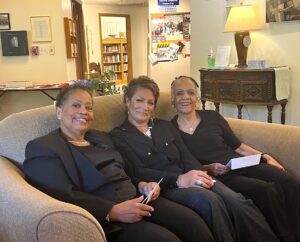
The founders of Resilience Productions (l-r) Liz Mitchell, Danielle Bruce, Gladys DeVane. | Courtesy photo
When Bruce finally signed on as project director and coordinated its theatrical production, community support had culminated in “standing room only” and waitlisted audiences for all three nights of the opening shows at the Waldron Arts Center Auditorium in October 2016. She recalls: “We had a 30-person cast and crew, employed all local talent. We told the unknown or forgotten stories of heroic African Americans throughout Indiana. It was triumphant and I believe actually impacted the community. It was a work everyone was very proud of.”
Their project’s success encouraged the women to start planning for Monroe County’s bicentennial celebration in 2018. Bruce says, “And if my memory serves me correctly, that’s how Resilience Productions was born.”
According to Bruce, at least 50 percent of the audience for Resilience Productions shows remain for the talkbacks. Because the shows are one-acts, she approaches the talkbacks as second acts, attempting to “craft an evening of theater that hopefully keeps an audience wanting more.” The content of their shows “can be on the heavier side, controversial with plenty to reflect upon,” so the group aims to keep the performances under 75 minutes. “We go right into the reception (like an intermission) and return for the talkback as our final act,” Bruce says. Ruth Aydt, who heads the Racial Justice Task Force of the Unitarian Universalist Church of Bloomington, is in charge of the receptions.
“
I’ve always seen the world through the lens of theater — which in my mind, is easy to do because theater is reality’s looking glass.
”
—Danielle Bruce
Bruce hopes the audience for More Than Your Honor might “walk out with their minds opened, and their walls down — even a little.” That way, “maybe we have a better shot at hearing each other,” she says. “If our shows can help chip away at the prejudices and the narrow-mindedness and fear that’s preventing people from connecting and creating better lives together, then I see that as a success.”
Although Bruce foresees that recent legislation attacking diversity, equity, and inclusion (DEI) might negatively impact funding for Resilience Productions, she is also hopeful about the company’s continuing cultural relevance. She says, “Since we are not in the most conventional field of work and our very content is entirely rooted in diversity, equity and inclusion — historically as well as presently — this kind of censure and disregard only makes us even more necessary and relevant. Our shows are more important now than ever before.”
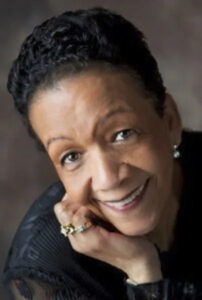
Gladys DeVane | Courtesy photo
Gladys DeVane
Gladys DeVane started as an actor/storyteller when she was nine. By the time she started high school, she had become known as an accomplished storyteller. After graduating from Oklahoma State University, where she earned her bachelor’s degree in speech therapy and speech communication, she went on to earn a master’s degree and a Ph.D. from Indiana University-Bloomington.
Throughout her 38 years of teaching and administrative work at IU, she took a break from acting and storytelling to focus on her professional career and her responsibilities as a wife and mother. After she retired in 2003, she returned to theater. She says, “I had always wanted to be an actor, and now that I had retired, I could spend my time and energy developing and refining my acting skills.”
DeVane’s first major stage role since her return to theater was Mudear in Marsha Estell’s Heat, produced by the Bloomington Playwrights Project in 2005. This role was followed by a second one, Bessie, in Cardinal Stage Company’s 2009 production of Emily Mann’s Having Our Say: The Delany Sisters’ First 100 Years.
While she would bond with Danielle Bruce in 2009, she first met Liz Mitchell around 2008, when she was cast in One More River to Cross, a production on which DeVane was collaborating with the late James Mumford. After she and Mitchell applied for a grant for Indiana’s bicentennial celebration through the Indiana Arts Alliance, they became close friends and co-founders of Resilience Productions.
DeVane’s observation about the scarcity of character roles for older Black women encouraged her to write ones for her own one-act performances. These roles would depict African American women’s strength and resilience by telling their stories. She says, “When we formed Resilience Productions, my experience as a storyteller and writer made me the logical person to assume the responsibility of writing.”
“
My job is to tell the stories of our ancestors, the forgotten stories, the stories of African American contributions to the making of this country, and the stories of the marginalized.
”
—Gladys DeVane
At first, DeVane had not considered writing as something she could do well. But after she wrote her first story, “God Don’t Make No Mistakes,” she discovered that she enjoyed writing and began to feel, she says, that she was “quite good at weaving powerful and gripping narratives capable of captivating an audience.”
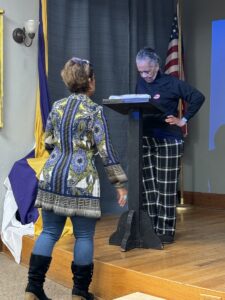
Danielle Bruce (left) and Gladys DeVane in 2024 during a rehearsal. | Courtesy photo
In addition to her storytelling and writing experiences, she says she brings “85 years of wisdom” to Resilience Productions. Those years began in Oklahoma and Texas, where she grew up and which she calls “two states not known as bastions of progressive liberalism.”
Her recollections of Jim Crow, racial segregation, and the Civil Rights Movement, together with her experiences with protest participation and special-needs program development, coalesced into “the knowledge needed to write authentically about racial, social, and economic struggles of the marginalized,” she says. Additionally, her experiences of raising three sons, one of whom is severely cognitively challenged, and training them to “navigate this often hostile and less than welcoming world,” have encouraged her to “write from the heart.”
She says, “My job is to tell the stories of our ancestors, the forgotten stories, the stories of African American contributions to the making of this country, and the stories of the marginalized.” That is why her goal is to enable audiences to “think, reflect, and perhaps begin to look at the world through different lenses.”
DeVane believes recent DEI legislation will have little impact on the work of Resilience Productions because the organization does not depend on federal or state funding, thanks to Bloomington’s strong community support. She says, “DEI legislation aims to erase or minimize the importance of the histories of certain minority groups under the guise of CRT [Critical Race Theory]. The mission of Resilience Productions is to tell the stories that DEI legislation does not want told.”
Liz Mitchell

Liz Mitchell | Courtesy photo
Born in 1953, Liz Mitchell grew up during segregation and lived through the Civil Rights Movement. During her freshman year of high school, she was one of 76 Black students who integrated Arlington High School in Indianapolis. She moved to Bloomington in 1979 where she became the city’s first Black woman U.S. Postal Service employee. There, she remained the only Black woman USPS employee throughout her 35 years of service.
Mitchell has always been interested in researching African American history. “I find it fascinating and exhilarating to learn about a history that has not been shared,” she says. She traveled throughout the U.S., sometimes on two-lane roads, to discover and record untold stories. Then, she would further research the ones that caught her attention. “I have tubs of untold stories,” she says.
After she shared her discovered stories with Gladys DeVane, they decided to collaborate. They combined Mitchell’s passion for gathering historical information with DeVane’s love of writing to produce and stage plays. Since Mitchell’s retirement from USPS, she could actualize their collaboration plans, starting with work toward their first play, Resilience: Indiana’s Untold Story, for Indiana’s bicentennial celebration. The most challenging aspect of production was deciding which stories could be most effectively staged.
As historical researcher for Resilience Productions, Mitchell says her most rewarding experience is discovering obscure information about African Americans for inclusion in plays. For example, she was excited to discover Cathay Williams, the first Black woman to join the U.S. Army and a Buffalo Soldier who helped protect white settlers who were heading westward.
“
I’ve been around for a long time, and things have not changed nearly as much as people would like to think that they have. Therein lies the importance of history.
”
—Liz Mitchell
When asked about the possible impact of recent DEI legislation on Resilience Productions, Mitchell replied, “I’ve been around for a long time, and things have not changed nearly as much as people would like to think that they have. Therein lies the importance of history. There was a pursuit of a more equitable and equal America long before the era of DEI.” She believes in the importance of educating the public about “how women fought to be treated with respect and have a solid footing in our society.”
“Out of the politics of today, strong women will rise to the top, who will deserve their place in history,” she says “So, Resilience Productions will have plenty of stories to tell.”
In these exceptional times when diversity, equity, and inclusion practitioners face the possibility of penalties from the U.S. federal government, the untold stories about African American women are more relevant than ever. Danielle Bruce, Gladys DeVane, and Liz Mitchell of Resilience Productions are keenly aware of this relevance, as they bring to the stage Judge Viola Taliaferro this Women’s History Month.
Judge Viola Taliaferro (1928–2023)
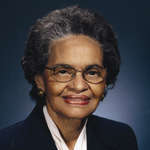
Judge Viola Taliaferro | Courtesy photo
The subject of the upcoming 11th installment of the Remarkable Women Series, presented by Resilience Productions and the Monroe County History Center, Judge Viola Taliaferro is a Bloomington icon and Monroe County’s groundbreaking law practitioner. After graduating from Indiana University’s Maurer School of Law in 1977, she practiced law for 12 years, becoming the first African American to serve as both a magistrate and a judge in the Monroe County Circuit Court.
Taliaferro was also a consultant for U.S. Attorney General Janet Reno, served on the National Research Council on Juvenile Crime, and was elected to the American Law Institute. After she retired from the bench in 2004, she continued to take on special projects for the Indiana Supreme Court.
Judge Viola Taliaferro was married to George Taliaferro, the late IU football Hall of Famer, with whom she shattered racial barriers, both on campus and within the Bloomington community. In 2021, the pair was honored for their impact on education, athletics, and the justice system when Big Ten Commissioner Kevin Warren announced the creation of the George and Viola Taliaferro Fellowship.
“Known as the ‘Children’s Judge’ this pioneering, remarkable woman set the standard as a judge, educator, wife and mother, reminding us that there is nothing a woman can’t do.” —Monroe County History Center Events Calendar
Show Info
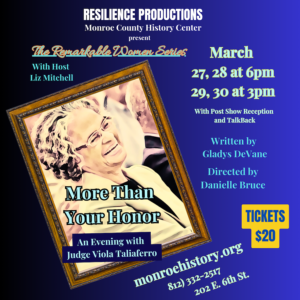 Show times for More Than Your Honor: An Evening with Judge Viola Taliaferro are 6 p.m., 27 & 28 March and 3 p.m., 29 & 30 March, at the Monroe County History Center (202 E. 6th St., Bloomington). Tickets are $20 and can be purchased at the History Center, or by calling (812) 332-2517.
Show times for More Than Your Honor: An Evening with Judge Viola Taliaferro are 6 p.m., 27 & 28 March and 3 p.m., 29 & 30 March, at the Monroe County History Center (202 E. 6th St., Bloomington). Tickets are $20 and can be purchased at the History Center, or by calling (812) 332-2517.
There will be a reception and talkback after each show.
For information about this program and others, see the History Center’s events calendar.
More Remarkable
Listen to “A Strange Day,” written and narrated by Gladys DeVane (episode 46, Speaking of Stories, WFHB).
DeVane’s book is Come Sit with Me: Life in Poetry, Prose and Plays (illustrations by Danielle Bruce, Jewell Jordan Publishing, 2021).
More Local Theater
For info on other Bloomington theater companies, see these Limestone Post stories by Hiromi Yoshida:
“‘Laugh, Cry, Sweat’ with New Theater Company Eclipse Productions” (April 24, 2024)
“Off Night Productions Increases Theatrical Roles for Women and Nonbinary Artists” (July 7, 2023)
Hiromi’s other articles for LP can be found on her contributor’s page.

